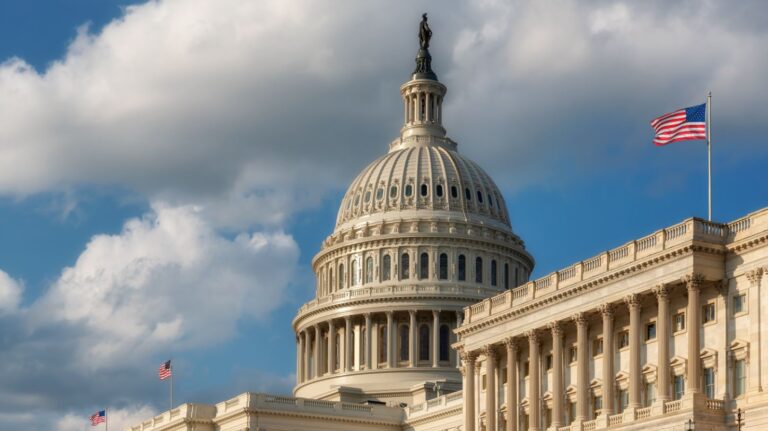A bipartisan bill called the “Promoting Resilient Supply Chains Act” has been introduced in the US Senate, having already been ‘overwhemingly passed’ in the House of Representatives.
The legislation would ‘create a whole-of-government approach to mapping, monitoring and proactively strengthening American supply chains, bringing manufacturing jobs back home and lowering costs for American consumers’.
It proposes additional responsibilities for the secretary of commerce surrounding supporting the strength and resiliency of critical industries and supply chains. It also proposes that the Department of Commerce establish a critical supply chain resiliency and crisis response programme within 180 days of its enactment.
The bill was introduced in the Senate on 21 May by Democrat senator Maria Cantwell of Washington and Republican senator Marsha Blackburn of Tennessee.
Senator Cantwell commented: “From our aerospace manufacturers to our growers, Washington state relies on robust supply chains to produce, grow and ship our products to the world. One supply chain shock can disrupt the entire system, driving shortages and raising costs.
“Our legislation will get the government, businesses and manufacturers working together to identify gaps and build capacity to prevent supply chain disruptions before they happen. It will strengthen American manufacturing jobs, keep our store shelves stocked and lower costs for American families.”
Senator Blackburn added: “The Promoting Resilient Supply Chains Act leverages both quantum computing and artificial intelligence to predict and mitigate supply chain shocks, ensuring that technology is at the forefront of our national supply chain strategy.”
The bill was also introduced in the House of Representatives by Democrat congresswoman Lisa Blunt Rochester of Delaware and Republican congressman Larry Buchson MD of Indiana. On 15 May, the House passed the bill by a vote of 390-19. It was then considered and subsequently passed by the House Energy & Commerce Committee by a vote of 44-0.
“I am extremely proud that the House overwhelmingly passed the Promoting Resilient Supply Chains Act today,” said representative Blunt Rochester, a member of the House Energy and Commerce Committee, on 15 May.
She continued: “Since the Covid-19 pandemic, I have heard from Delawareans up and down our state who have been affected by shortages of goods caused by shocks to our supply chains.
“This bill is necessary. It will help us mobilise our government to anticipate shocks before they occur and, as a result, create good-paying jobs and lower costs for consumers.
“I am grateful to representative Bucshon for his partnership on this effort and look forward to working with my colleagues to get it to president Biden’s desk for signature.”
Representative Bucshon added: “Hoosier industries ranging from automotive to drug manufacturing have experienced supply chain bottlenecks and shocks in recent years that have hampered production and negatively impacted consumers.
“Through mapping and monitoring supply chains throughout the United States, the Promoting Resilient Supply Chains Act will help identify where our vulnerabilities are and how to address them, making our economy more stable and resilient going forward.”
“Encouraging American manufacturers to diversify their supply inputs so that they aren’t solely reliant on unpredictable and adversarial trading partners, like China, is good policy that will keep the American economy open for business no matter what is happening around the globe.”
Strengthening US supply chains has been a key concern for the Biden-Harris Administration, with president Joe Biden announcing ‘nearly 30 new actions to strengthen supply chains critical to America’s economic and national security’ in November 2023.
Reducing reliance on China seems to be a major concern for both parties ahead of the November presidential election. Biden recently announced increased tariffs on the import of goods from China including semiconductors, electric vehicles and medical products. Meanwhile, Republican candidate and former president Donald Trump has suggested he would consider introducing tariffs of above 60% on China if he were to return to the White House.
The recent escalation of the US-China trade war has encouraged more companies to consider diversifying their intersupply chains. Tesla has reportedly urged suppliers to manufacture parts outside of China and Taiwan, Apple has explored the potential of manufacturing goods elsewhere in Asia and AstraZeneca is planning independent pharmaceutical supply chains for the US and China.
“We have a very large supply chain, and we are organising ourselves so that we can actually supply the United States and Europe independently,” AstraZeneca CEO Pascal Soriot told Bloomberg News in March, adding: “We also are building a presence here in China so we can actually supply Chinese patients independently.”
If the bill is passed in the Senate, it will then need to be sent to the president, whose signature would allow it to become law.
Following the undeniable success of IntraLogisteX 2024 in the UK, the exhibition is heading across the Atlantic later in the year, with IntraLogisteX USA taking place on 22-23 October 2024 at Miami Beach Convention Centre.
Click here for more details and to register!
Plus, the Supply Chain Excellence Awards are also heading stateside as Miami welcomes the very first Supply Chain Excellence Awards USA on 21 October 2024.
For more information about the awards, categories and how to enter, click here!







